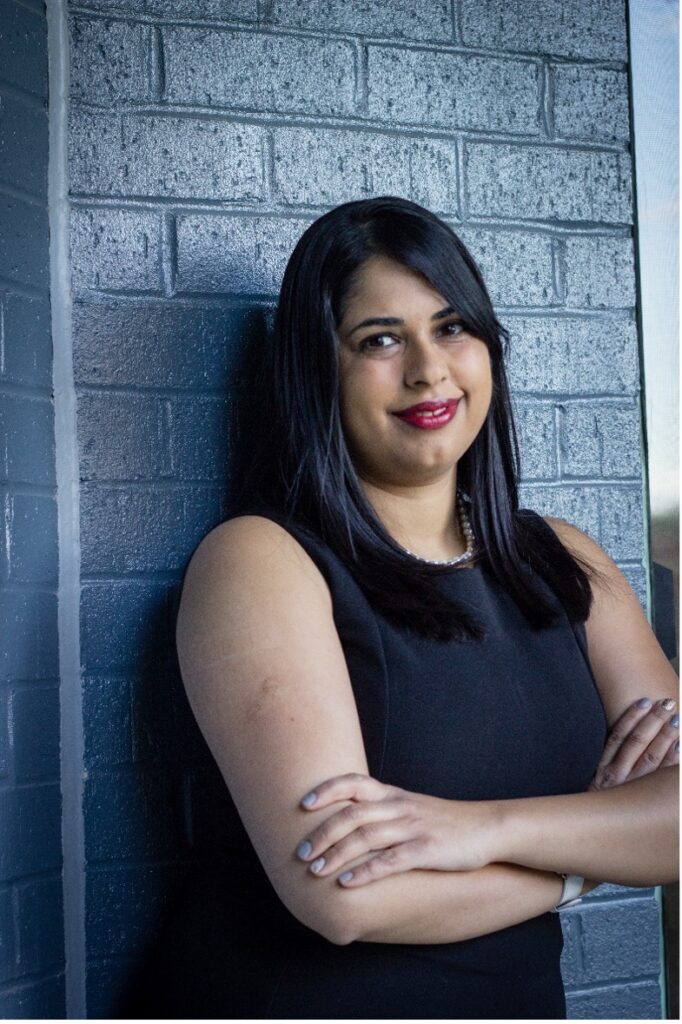By Kamila Kinyon
This Winter we will be publishing a series of spotlight articles about multilingual students and faculty at DU. These articles are based on interviews that Dr. Kamila Kinyon and a group of multilingual students conducted about interviewees’ lived experiences, including continuing connection to heritage languages, role as writers and teachers at DU, and thoughts about multilingual and multicultural identity. This project is funded by a Faculty Research Fund Grant awarded to Dr. Kinyon for 2023-25. We welcome this opportunity to celebrate DU’s multilingual community.
DU history professor Trishula Patel grew up in Zimbabwe in a family descended from immigrants from India. The history of South Asian diaspora in Zimbabwe became the subject of Trishula’s doctoral dissertation and of a forthcoming book. In an oral history interview that will be archived through DU’s Digital Commons, Trishula shared details about her unique multilingual heritage.
As a result of her immigrant background and her residence in diverse countries, Trishula knows multiple languages. She is most fluent in English: “I am very much Anglicized…I blame that on British colonialism.” In fact, when arriving to England for a short trip, she relates that an uber driver told her “welcome home” after speaking to her briefly and noting her accent: “Whenever I go to London I feel completely at home.” However Gujarati is the language she connects with her Indian cultural heritage. Since Trishula’s parents typically spoke to her in English, she never gained fluency in Gujarati, so when her grandaunt came to live with her family, Trishula recalls: “She only spoke Gujarati…I only spoke English. We still understood each other…I wish I had learned from her how to speak.” She currently understands the basics but cannot respond fluently. Trishula’s limited knowledge of Gujarati led her to enlist her mother’s help when working on her dissertation. As a native speaker, her mother helped her both with oral history and archival translation for the project. Her mother continued to teach Trishula Gujarati as an adult which led her to improve her proficiency, albeit with more difficulty than if she had used it regularly while still a child.
In addition to English and Gujarati, Trishula also studied an African language as well as French. During her school years, she wanted to learn languages indigenous to her home, Zimbabwe, and she therefore learned Shona. Given her Indian heritage, she relates that her schoolmates often assumed she wouldn’t know this language. On one occasion, they even spoke critically about her in Shona in front of her, and they were surprised when they realized she understood them. Trishula’s ongoing connection to Africa and its languages is implicit in her poem “Real Africa.” In this poem that went viral she incorporates a hard to translate Shona proverb about a tree taking root. In addition, Trishula has studied chilapalapa, an informal “derogatory language of command” used in Southern Africa. This hybrid mix of English, Gujarati, Afrikaans, and Shona is used for communication between employers and employees: “You use that language as a bridge because no one fully spoke the other’s language.” At school and at university, Trishula also studied French, a language she was able to use professionally when freelancing for a publication that worked with the U.N.
When asked about the impact of multilingualism on her research, Trishula notes that in her dissertation and in the corresponding book project she translated oral history and archival material from Gujarati to English. At times, this was challenging since some words don’t have an English equivalent. A case in point is in kinship terms which are much more detailed in Gujarati than in English. For example, “you have different words for paternal and maternal grandparents…father’s older brother…or mother’s sister’s husband” since “in these cultures the types of family relationships are very important.” As a future article project, Trishula plans to write about culinary history in the South Asian diaspora in Africa. Describing and translating food terms will lead to semantic subtleties and complexities in translation, especially since there are “different words for the same food,” often implying “a really subtle change.” For these types of projects, proficiency in multiple languages is very important.
Trishula suggests that the University of Denver could better support its multilingual community by offering a wider variety of languages and by offering a broader spectrum of language testing. Students who know languages that DU doesn’t offer should be allowed to be tested in these languages and to receive corresponding credit towards their language requirement. Given the prominence of Zoom, it should be fairly simple to find examiners. As a comparison, Trishula recalls that when she needed to take her language exams at Georgetown University for a Fulbright fellowship, the university eventually found her an examiner in Shona, although this was more difficult for them than giving her a French exam. Regarding class offerings at DU, Trishula notes that the university lacks classes in many Asian and African languages that students and faculty could benefit from studying. For instance, she would like to study Swahili, since it is a lingua franca, but the University of Denver does not offer it. A broader spectrum of language classes could greatly benefit the university.
Trishula’s unique background in a diasporic Indian immigrant community speaks to the complexity of the multilingual experience, as there is an interplay between heritage languages, languages promoted in school, and indigenous languages important to one’s local community. As an immigrant to the U.S. and a historian, the knowledge and use of different languages continues to be centrally important in her life and work. Trishula’s experiences speak to the importance of linguistic diversity and can serve as an inspiration for other multilingual speakers and writers.

